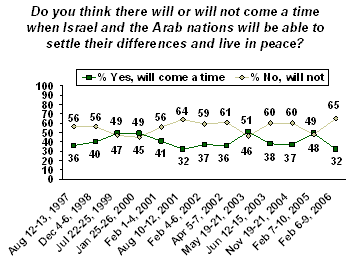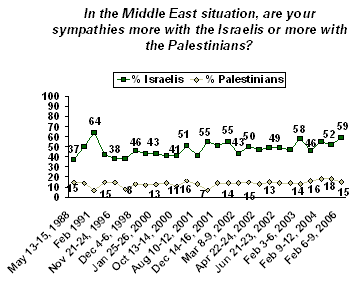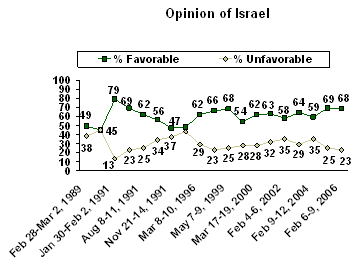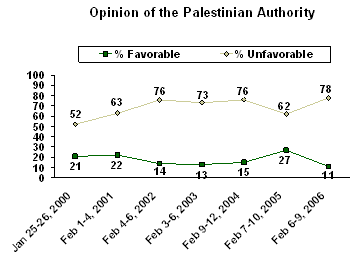PRINCETON, NJ -- The continuing and escalating violence in the Middle East will come as no surprise to many Americans, a majority of whom hold the attitude even before the most recent crisis that peace in the Middle East will not occur in their lifetimes. A review of Gallup Poll data on American attitudes toward the Middle East also shows that Americans have historically been very sympathetic to Israel, and view Israel more favorably than they do the Palestinian Authority, Lebanon, Syria, or Iran. A Gallup Poll, conducted in June, also found that -- even before the most recent violence -- the majority of Americans believed that the U.S. intervention in Iraq had made prospects for democracy in the Middle East either no better or worse than before March of 2003.
Peace in the Middle East
Americans have recently been quite pessimistic about the chances of peace in the Middle East, suggesting that the most recent violence between Israel and Hezbollah will come as no surprise.
Gallup's most recent update on the American public's attitudes on World Affairs (conducted Feb. 6-9, 2006) found that by a two to one margin, Americans said there will never come a time when Israel and the Arab nations will live in peace. That survey was conducted shortly after the Palestinians elected the Hamas party to run their government, and reflects the most pessimistic attitudes toward the Middle East since Gallup first asked this question in 1997. The public's attitudes toward the possibility of peace in the Middle East have fluctuated some over the last decade, ranging from a point in May 2003, when a slight majority said that peace would occur to several surveys in recent years -- including the most recent one -- in which 6 in 10 or more Americans said that there will never be a time when Israel and its Arab neighbors will be able to settle their differences and live in peace.

Sympathies in the Middle East Situation
Historically, Americans have been very sympathetic to Israel in the Middle East, and have given Israel high favorable ratings.
Gallup's basic "sympathies" question is worded as follows: "In the Middle East situation, are your sympathies more with the Israelis or more with the Palestinians?" The most recent measure on this question, from the Feb. 6-9 poll, finds that 59% of Americans sympathize more with Israel, while 15% side more with the Palestinians, and the remaining 26% do not take either side or do not have an opinion.
The latest figures represent one of the most lopsided margins in favor of the Israelis ever recorded by Gallup. The only other times sympathy has been this high were during the first Persian Gulf War in February 1991, (when Iraq was launching Scud missiles into Israeli territory) and shortly before the start of the second war with Iraq, in February 2003, (58%). In 2004 and 2005, sympathy toward the Palestinians, though still low, was as high as it has been historically (18%).

Views of Israel, the Palestinian Authority, and Lebanon
Americans are much more likely to say they have a favorable opinion of Israel than they are other countries in the Middle East.
The Feb. 6-9 poll finds that 68% of Americans have a favorable opinion of Israel, while 23% have an unfavorable view of that country. These results are essentially the same as what Gallup measured in February 2005. Views of Israel were most positive during the Persian Gulf War in 1991, with 79% of Americans rating Israel favorably at that time. Israel's favorable ratings reached their lowest point in Gallup's history, 47%, in November 1991.

Americans' ratings of the Palestinian Authority have been quite negative since Gallup began measuring them in 2000, and reached their all-time low point earlier this year, with 11% rating the Palestinian Authority favorably and 78% unfavorably. These ratings were more positive last year, with a 27% favorable and 62% unfavorable rating.

Gallup has not measured Americans' ratings of Lebanon with this basic favorable or unfavorable question wording. However, in 2002, a slightly differently worded question found that only 17% of Americans had a favorable view of Lebanon, while 45% rated Lebanon unfavorably. Thirty percent of Americans said they had neither a favorable or unfavorable view of the country.
Gallup's most recent measures of attitudes toward other countries involved in the current crisis in the Middle East have also been quite negative. The February 2006, survey found that only 7% of Americans rate Iran favorably, and a 2005, survey found that 25% rated Syria favorably.
Impact of the Iraq War on the Middle East
The current violence in the Middle East suggests that the U.S. involvement in the Iraq war has -- at least to this point -- not had the impact of lowering the potential for violence in that region.
A recent USA Today/Gallup poll asked Americans if they believed that the U.S. initiation of the war in Iraq had made prospects for democracy in the Middle East better, worse, or had not made much difference.
The results show that while a little more than a third of Americans said at that point that the Iraq war had made prospects for democracy in the Middle East better off, the majority said that there had been no impact either way, or that the war had made prospects for democracy in the region worse (the table below shows this response in the context of the other five items included in the question):
|
Better or Worse Off as a Result of the War in Iraq, June 9-11, 2006 |
||||
|
Better off |
Same |
Worse off |
No opinion |
|
|
% |
% |
% |
% |
|
|
The Iraqi people |
48 |
19 |
29 |
4 |
|
The strength and preparedness of the U.S. military |
42 |
29 |
25 |
4 |
|
The war on terrorism |
40 |
29 |
29 |
2 |
|
The prospects for democracy in the Middle East |
37 |
33 |
26 |
5 |
|
The people of the United States |
26 |
31 |
42 |
2 |
|
The image of the U.S. around the world |
11 |
26 |
60 |
3 |
Similarly, responses to a NBC News/Wall Street Journal question asked in March show that more than 8 in 10 Americans believe that the U.S. has gotten further away from objectives of peace and democracy in the Middle East region "over the past few months," or things have stayed about the same. Only 17% believed that the U.S. had gotten closer to these objectives:
|
Thinking about the whole Middle East, including Iraq, Iran, Palestine and Israel, do you feel that over the past few months, the United States has gotten closer to its objectives of peace and democracy for the region, further away from its objectives of peace and democracy, or have things stayed about the same? NBC News/Wall Street Journal Poll, March 10-13, 2006 |
|
|
% |
|
|
Gotten closer to objectives of peace and democracy |
17 |
|
Gotten further away from objectives of peace and democracy |
41 |
|
Things have stayed about the same |
40 |
|
Not sure |
2 |
Survey Methods
The latest results are based on telephone interviews with a randomly selected national sample of approximately 1,000 adults, aged 18 and older. For results based on this sample, one can say with 95% confidence that the maximum error attributable to sampling and other random effects is ±3 percentage points. In addition to sampling error, question wording and practical difficulties in conducting surveys can introduce error or bias into the findings of public opinion polls.
24. In the Middle East situation, are your sympathies more with the Israelis or more with the Palestinians?
|
Israelis |
Palestinians |
BOTH (vol.) |
NEITHER (vol.) |
No opinion |
|
|
% |
% |
% |
% |
% |
|
|
2006 Feb 6-9 |
59 |
15 |
5 |
13 |
8 |
|
2005 Feb 7-10 |
52 |
18 |
7 |
12 |
11 |
|
2004 Feb 9-12 |
55 |
18 |
7 |
12 |
8 |
|
2003 May 19-21 |
46 |
16 |
12 |
14 |
12 |
|
2003 Feb 3-6 |
58 |
13 |
6 |
11 |
12 |
|
2002 Sep 2-4 |
47 |
14 |
6 |
19 |
14 |
|
2002 Jun 21-23 |
49 |
14 |
8 |
19 |
10 |
|
2002 May 20-22 |
49 |
15 |
7 |
19 |
10 |
|
2002 Apr 22-24 |
47 |
13 |
9 |
18 |
13 |
|
2002 Apr 5-7 |
50 |
15 |
9 |
17 |
9 |
|
2002 Mar 8-9 |
43 |
14 |
6 |
20 |
17 |
|
2002 Feb 4-6 |
55 |
14 |
6 |
14 |
11 |
|
2001 Dec 14-16 |
51 |
14 |
5 |
17 |
13 |
|
2001 Sep 14-15 |
55 |
7 |
4 |
20 |
14 |
|
2001 Aug 10-12 |
41 |
13 |
7 |
18 |
21 |
|
2001 Feb 1-4 |
51 |
16 |
7 |
14 |
12 |
|
2000 Oct 13-14 ^ |
41 |
11 |
9 |
18 |
21 |
|
2000 Jul 6-9 |
41 |
14 |
5 |
18 |
22 |
|
2000 Jan 25-26 |
43 |
13 |
5 |
21 |
18 |
|
1999 Jul 22-25 |
43 |
12 |
11 |
19 |
15 |
|
1998 Dec 4-6 |
46 |
13 |
5 |
22 |
14 |
|
1997 Aug 12-13 |
38 |
8 |
5 |
19 |
30 |
|
1996 Nov 21-24 |
38 |
15 |
6 |
14 |
27 |
|
1993 Sep 10-12 |
42 |
15 |
6 |
17 |
20 |
|
1991 Feb |
64 |
7 |
19 |
-- |
10 |
|
1989 Aug |
50 |
14 |
15 |
-- |
21 |
|
1988 May 13-15 |
37 |
15 |
22 |
-- |
27 |
|
(vol.) = Volunteered response |
|||||
|
^ Based on interviews with 821 national adults; +/-4 pct. pts. |
|||||
|
May 1988-April 2002 and February 3-6, 2003 WORDING: In the Middle East situation, are your sympathies more with the Israelis or more with the Palestinian Arabs? |
|||||
25. Do you think there will or will not come a time when Israel and the Arab nations will be able to settle their differences and live in peace?
|
Yes, there will come a time |
No, there will not |
No opinion |
|
|
% |
% |
% |
|
|
2006 Feb 6-9 |
32 |
65 |
3 |
|
2005 Feb 25-27 |
40 |
56 |
4 |
|
2005 Feb 7-10 |
49 |
48 |
3 |
|
2004 Nov 19-21 |
37 |
60 |
3 |
|
2003 Jun 12-15 ^ |
38 |
60 |
2 |
|
2003 May 19-21 |
51 |
46 |
3 |
|
2002 Apr 5-7 |
36 |
61 |
3 |
|
2002 Feb 4-6 |
37 |
59 |
4 |
|
2001 Aug 10-12 |
32 |
64 |
4 |
|
2001 Feb 1-4 |
41 |
56 |
3 |
|
2000 Jan 25-26 |
49 |
45 |
6 |
|
1999 Jul 22-25 |
49 |
47 |
4 |
|
1998 Dec 4-6 |
40 |
56 |
4 |
|
1997 Aug 12-13 |
36 |
56 |
8 |
|
^ Asked of a half sample. |
|||
22. Next, I'd like your overall opinion of some foreign countries. First, is your overall opinion of [ISRAEL or THE PALESTINIAN AUTHORITY] very favorable, mostly favorable, mostly unfavorable, or very unfavorable?
Israel
|
Very favorable |
Mostly favorable |
Mostly unfavorable |
Very unfavorable |
No opinion |
|
|
% |
% |
% |
% |
% |
|
|
2006 Feb 6-9 |
21 |
47 |
18 |
5 |
9 |
|
2005 Feb 7-10 |
19 |
50 |
20 |
5 |
6 |
|
2004 Feb 9-12 |
14 |
45 |
25 |
10 |
6 |
|
2003 Feb 3-6 |
22 |
42 |
23 |
6 |
7 |
|
2002 Feb 4-6 |
16 |
42 |
25 |
10 |
7 |
|
2001 Feb 1-4 ^ |
18 |
45 |
20 |
12 |
5 |
|
2000 Mar 17-19 |
16 |
46 |
20 |
8 |
10 |
|
2000 Jan 25-26 |
11 |
43 |
21 |
7 |
18 |
|
1999 May 7-9 |
15 |
53 |
19 |
6 |
7 |
|
1999 Feb 8-9 |
18 |
48 |
16 |
7 |
11 |
|
1996 Mar 8-10 |
17 |
45 |
18 |
11 |
9 |
|
1992 Feb 6-9 |
12 |
36 |
27 |
16 |
9 |
|
1991 Nov 21-14 |
11 |
36 |
26 |
11 |
16 |
|
1991 Sep 26-29 |
11 |
45 |
25 |
9 |
10 |
|
1991 Aug 8-11 |
15 |
47 |
19 |
6 |
12 |
|
1991 Mar 14-17 |
20 |
49 |
16 |
7 |
8 |
|
1991 Jan 30-Feb 2 |
28 |
51 |
10 |
3 |
8 |
|
1989 Aug 10-13 |
11 |
34 |
29 |
16 |
10 |
|
1989 Feb 28-Mar 2 |
8 |
41 |
25 |
13 |
13 |
The Palestinian Authority
|
|
Very favorable |
Mostly favorable |
Mostly unfavorable |
Very unfavorable |
No opinion |
|
% |
% |
% |
% |
% |
|
|
2006 Feb 6-9 |
1 |
10 |
49 |
29 |
10 |
|
2005 Feb 7-10 |
3 |
24 |
43 |
19 |
11 |
|
2004 Feb 9-12 |
2 |
13 |
44 |
32 |
9 |
|
2003 Feb 3-6 |
1 |
12 |
44 |
29 |
14 |
|
2002 Feb 4-6 |
3 |
11 |
44 |
32 |
10 |
|
2001 Feb 1-4 ^ |
4 |
18 |
39 |
24 |
15 |
|
2000 Jan 25-26 |
3 |
18 |
36 |
16 |
27 |